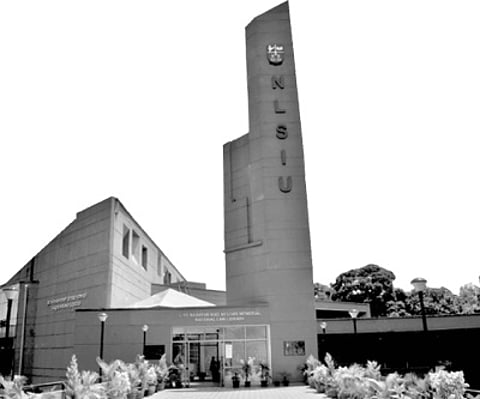Inside Harvard of the East
One of the first law schools in the country, National Law School of India University (NLSIU), Bangalore is a pioneer in imparting legal education. “It is an honour and a privilege to speak to students of an institution which has rightly been called the ‘Harvard of the East’. Perhaps, your great institution must envision a day when Harvard will be called the ‘National Law School of the West’. You have been privileged to receive an education which many yearn, but very few learn,” said M Veerappa Moily, Union law minister while addressing the gathering at the NLSIU convocation in August 2010.
Courses offered
“We provide intellectually stimulating, socially relevant and professionally competent legal education,” says a proud R Venkata Rao, vice-chancellor, on what sets apart NLSIU from other law schools. Established in 1987,
NLSIU sprawls over 23 acres. The institute came into existence through a notification under the National Law School of India University Act (Karnataka Act 22 of 1986).
NLSUI offers BA LLB (hons), a five-year integrated course, and master’s of laws (LLM) at the postgraduate level, four research degrees — MPhil, PhD and LLD and distance education courses in master’s of business law, PG diploma in human rights law, PG diploma in medical law and ethics, PG diploma in environmental law, PG diploma in intellectual property rights law and PG diploma in child rights law.
Infrastructure
NLSIU is a residential university, wherein the students and staff have to stay on campus. The campus houses the following blocks — academic block, three halls of residence, each for men and women students, two hostels for PG students, three blocks of faculty quarters and two residential blocks exclusively for nonteaching staff.
The library spread over 30,000 sq ft has a collection of over 40,000 volumes and journals that cover a wide range of subjects. The university also subscribes to international online databases like Westlaw, Jstor, Springerlink, etc. All classrooms are equipped with computers and projectors with some of them armed with E class equipment, which will be further extended to other classrooms as well. Video conferencing facilities are also provided to enable students to interact with faculty in India and abroad. They also have an international training centre, sports, healthcare, banking, etc and house research centres such as Centre for Women and the Law (CWL), National Institute for Alternate Dispute Resolution (NIADR) and Centre for Child and the Law (CCL). Justice SH Kapadia, Chief Justice of India is the chancellor of the university. NLSIU has partnered with Osgode Hall Law School, Canada; Bucerius Law School, Germany; George Town University Law Centre, USA; University of Cologne and University of Zurich, Germany and Singapore Management University, Singapore for student exchange programmes.
Student committees
“The institute functions from 8.15 am to 1.30 pm, but the real work begins only after class hours. Students are taught outside the syllabus, and there are seminars on emerging topics and constant interactions by IAS and IPS officers, international professors/judges,” says Rao.
As part of the student culture, seniors monitor juniors and conduct classes occasionally as well. The Student Bar Association is divided into subcommittees like the academic support programme, campus development and management committee, cultural and fine arts committee, event management committee, law and technology committee, legal service committee, law and society committee, literary and debating society, moot court society, student advocate committee and sports committee, which are formed in the first week of July itself. “Our students bring out a lot of journals every year, which is an intellectual kick,” beams Rao.
Admissions
Admissions are based purely on merit through the Common Law Admission Test (CLAT). Intake for the UG programme is limited to 80 and for the PG programme, the same depends on the performance of the CLAT applicants. Future plans of the institute involve increasing the intake of the UG course and creating quality faculty through their courses.
— tasneem@newindianexpress.com

